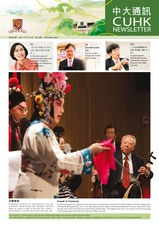Now that you have stepped down from University management and become the Master of a College. How do you feel?
Life is more or less as busy as it used to be, except that I get to handle fewer policy issues and papers of a complex nature and spend more time meeting students face to face. But since I have always been teaching, this is no strange task to me. In addition to Freshman Physics, I am teaching College General Education courses. Next term I will be teaching a University General Education Foundation Course. I am in constant touch with students and always think about what courses and activities should be provided to them. I think I am doing my bit to their education from another, perhaps higher, level. I enjoy what I do now.
New entrants to C.W. Chu College have to pledge to abide by the Honour Code. What is it?
The spirit of the Honour Code is based on mutual trust and not on an external regulatory regime. Similar systems have existed for a long time in overseas institutions, although we are the first in Hong Kong to advocate it. The Honour Code demands self-discipline from students in three areas: honesty, integrity, courtesy. Whenever there is a complaint, the Student Honour Code Society comprising entirely students will look into it, decide if there is a breach and if so mete out disciplinary actions within its ambit. We have put in place the respective complaint handling, investigation and appeal procedures. The idea is to put trust and responsibility on the students and let them tackle interpersonal or even moral issues that arise among students from a peer’s angle. It will do them immense good in their process of maturation.
Does the Honour Code take the place of the College’s disciplinary regime?
Simple disputes or complaints can be handled by this student-run regime. For more serious cases, or where academic honesty is concerned, the College may also take its disciplinary actions. The two systems run in parallel in some cases.
To you, the mission of university education is to educate students not only in one subject, but across multiple disciplines and cultivate their values. How often do you cross to other disciplines?
I seldom cross over to music and the fine arts. But I take delight in many other things, mainly through my undisciplined reading habit. For example, we are preparing a book club for the College, and a colleague who’s a computer scientist recommended John MacCormick’s Nine Algorithms that Changed the Future: The Ingenious Ideas That Drive Today’s Computers. I read it and learned a few ways to look at Google’s success. In a casual conversation, another colleague recommended Michael J. Sandel’s Justice: What’s the Right Thing to Do? I bought a copy and have started reading it. Last year, for the purpose of teaching a general education course, I read Ziauddin Sardar’s Reading the Qur’an: The Contemporary Relevance of the Sacred Text of Islam. Very revealing, though I haven’t finished it yet.
What books have you read recently?
I read a lot of the late Prof. Chen Chih-fan’s literary musings. Recently, Prof. Tung Yuan-fang gave me a few books of his and I am re-reading some of them. I feel like listening to an old friend again. I have been reading Jane Austen’s Pride and Prejudice. You know why? P.D. James, a favourite detective story writer of mine, wrote a sequel to Pride and Prejudice, titled Death Comes to Pemberley. Not only has P.D. James put a murder mystery twist to Austen’s classic but she has also done it in the style of Austen. The latecomer James led me back to Austen.
Can you tell us a little about the relationship between the Chu Scholars and C.W. College?
The establishment of C.W. Chu College was initiated and facilitated by a group of Chu Scholars who benefitted from the philanthropy of the late Dr. C.W. Chu, who did not just finance their education abroad but also accompanied them to their destinations and took good care of them in many ways during their stay abroad. The Chu Scholars were so appreciative that they decided to grow the seed sown by Dr. Chu. Our College is fortunate to have received from some Chu Scholars donations as well as contributions in other forms such as mentoring our students, sharing their experience and giving just a little help where it is needed. There are two Chu Scholars among our teachers. I find it particularly meaningful to be working with them to lay the foundation of the College.
You have received a Vice-Chancellor’s Exemplary Teaching Award. What’s the secret to teaching?
First, one has to know one’s subject thoroughly so that talking about it comes as naturally as in, say, walking and driving a car. One doesn’t even have to think about it. That would enable you to concentrate on your students in class and what happens there at any moment. Second, one has to have passion in one’s subject. You cannot disguise it and it would help tremendously if the students could feel and see you have it in you. It makes teaching all the more effective. Lastly, a good teacher has the skills of the scriptwriter, director and actor all rolled into one. He/she should be able to choose and organize his/her material, determine how to best present it, and give a good performance in the podium. Good teaching requires a combination of skills and attitude. 


































































































































































Social Bookmarks